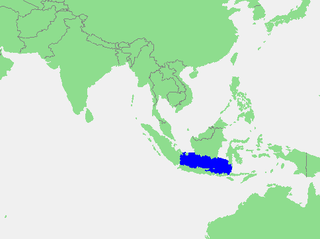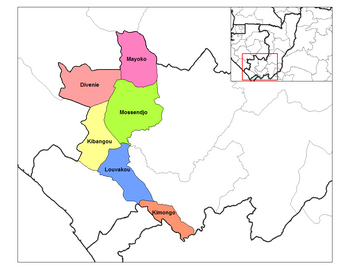
433Eros is a stony asteroid of the Amor group, and the first discovered, and second-largest near-Earth object. It has an elongated shape and a volume-equivalent diameter of approximately 16.8 kilometers. Visited by the NEAR Shoemaker space probe in 1998, it became the first asteroid ever studied from its own orbit.

The Java Sea is an extensive shallow sea on the Sunda Shelf, between the Indonesian islands of Borneo to the north, Java to the south, Sumatra to the west, and Sulawesi to the east. Karimata Strait to its northwest links it to the South China Sea. It is a part of the western Pacific Ocean.
This is a list of the extreme points of the United Kingdom: the points that are farther north, south, east or west than any other location. Traditionally the extent of the island of Great Britain has stretched "from Land's End to John o' Groats".

Niari is a department of the Republic of the Congo in the western part of the country. It borders the departments of Bouenza, Kouilou, and Lékoumou, and internationally, Gabon, the Democratic Republic of the Congo, and the Cabinda portion of Angola. The regional capital is Dolisie.
The Britannia Range is a range of mountains bounded by the Hatherton Glacier and Darwin Glacier on the north and the Byrd Glacier on the south, westward of the Ross Ice Shelf in Antarctica.
Bikoro is a market town in Équateur Province in the Democratic Republic of the Congo, lying on Lake Tumba, south of Mbandaka.

The Flores Sea covers 240,000 square kilometres (93,000 sq mi) of water in Indonesia. The sea is bounded on the north by the island of Celebes and on the south by the Sunda Islands of Flores and Sumbawa.

The Departments of the Republic of the Congo are divided into 86 districts and 6 communes; which are further subdivided into urban communities and rural communities ; which are further subdivided into quarters or neighborhoods (quartiers) and villages. Note the departments of Brazzaville and Pointe-Noire are made of 1 commune each, then divided in urban districts (arrondissements).

The servaline genet is a genet species native to Central Africa. As it is widely distributed and considered common, it is listed as Least Concern on the IUCN Red List.

Columbia-Tusculum is one of the 52 neighborhoods of Cincinnati, Ohio. Founded in 1788 and annexed in 1871, it is the city's oldest neighborhood. The population was 1,523 at the 2020 census.

Parliamentary elections were held in the Republic of the Congo on 24 June 2007, with a second round initially planned for 22 July 2007, but then postponed to 5 August 2007. According to the National Commission of the Organization of the Elections (CONEL), 1,807 candidates stood in the first round for 137 seats in the National Assembly. The ruling Congolese Labour Party and parties and independent candidates allied with it won 125 seats, while two opposition parties won a combined 12 seats.

Bates's slit-faced bat is a species of slit-faced bat frequently confused with Nycteris major. It is broadly distributed and common, living throughout many parts of Africa in forests and savannas.

The Bali Sea is the body of water north of the island of Bali and south of Kangean Island in Indonesia. The sea forms the south-west part of the Flores Sea, and the Madura Strait opens into it from the west.

Congo, officially the Republic of the Congo or Congo Republic, also known as Congo-Brazzaville is a country located on the western coast of Central Africa to the west of the Congo River. It is bordered to the west by Gabon, to the northwest by Cameroon, to the northeast by the Central African Republic, to the southeast by the Democratic Republic of the Congo, to the south by the Angolan exclave of Cabinda, and to the southwest by the Atlantic Ocean.
Antoine Ndinga Oba was a Congolese diplomat, political figure, and linguist. During the single-party rule of the Congolese Labour Party (PCT), he served in the government of Congo-Brazzaville as Minister of National Education from 1977 to 1984 and as Minister of Foreign Affairs from 1984 to 1991. Later, he was Congo-Brazzaville's Ambassador to UNESCO from 1998 until his death in 2005.
Pierre-Damien Boussoukou-Boumba is a Congolese politician. During the single-party rule of the Congolese Labour Party (PCT), he served in the government of Congo-Brazzaville as Minister of Health from 1979 to 1984, as Minister of Scientific Research from 1984 to 1989, and as Minister of Basic Education from 1989 to 1991. He was Ambassador to the United States in the 1990s and Minister of Small and Medium-Sized Enterprises from 1997 to 2002; subsequently he was a Deputy in the National Assembly of Congo-Brazzaville from 2002 to 2007. Boussoukou-Boumba was also President of the Union for the Defence of Democracy (UDD), a political party, from 1996 to 2011.

Paraipaba is a municipality in the state of Ceará in the Northeast region of Brazil.
Sturgeon Lake 154 is an Indian reserve of the Sturgeon Lake Cree Nation in northern Alberta, Canada that is surrounded by the Municipal District of Greenview No. 16. It is 85 km (53 mi) east of the City of Grande Prairie at an elevation of 700 m (2,300 ft).
Parthenina interstincta is a rather widely distributed species of sea snail, a marine gastropod mollusk in the family Pyramidellidae, the pyrams and their allies.












